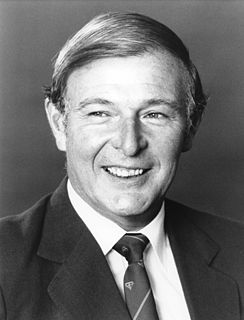
John Douglas Anthony, was an Australian politician. He served as leader of the National Party of Australia from 1971 to 1984 and was the second and longest-serving Deputy Prime Minister, holding the position under John Gorton (1971), William McMahon (1971–1972) and Malcolm Fraser (1975–1983).

Gilgandra is a country town in the Orana region of New South Wales, Australia, and services the surrounding agricultural area where wheat is grown extensively together with other cereal crops, and sheep and beef cattle are raised. Sitting at the junction of the Newell, Oxley and Castlereagh highways, the town is located in a wide bend of the Castlereagh River downstream from its source near Coonabarabran, directly downstream from Mendooran, and upstream from Gulargambone and Coonamble. It is 432 km north-west of Sydney, and is located approximately halfway on the inland route from Melbourne to Brisbane. The town is the administrative seat of the Gilgandra Shire. It is known as the town of windmills and the home of the 'Coo-ees', and is a gateway to the Warrumbungles National Park.
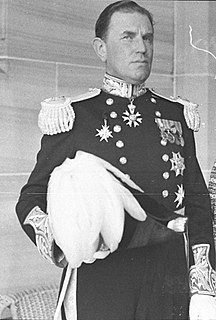
John de Vere Loder, 2nd Baron Wakehurst, was a British Army officer, politician and colonial administrator. After serving in the army, the Foreign Office, and as a Conservative Member of Parliament (MP) in the House of Commons, Wakehurst was appointed as the last British Governor of New South Wales, which he held from 1937 to 1946. Upon returning to Britain he was appointed Governor of Northern Ireland from 1952 to 1964. He was made a Knight of the Order of the Garter in 1962 and died in 1970.
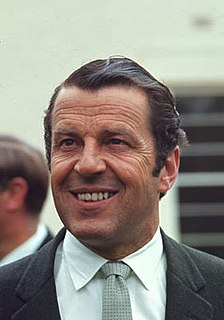
Donald Leslie Chipp, AO was an Australian politician who was the inaugural leader of the Australian Democrats, leading the party from 1977 to 1986. He began his career as a member of the Liberal Party, winning election to the House of Representatives in 1960 and serving as a government minister for a cumulative total of six years. Chipp left the Liberals in 1977 and was soon persuaded to lead a new party, the Democrats who, he famously proclaimed in 1980, would "keep the bastards honest". He was elected to the Senate on 10 December 1977 and led the party at four federal elections. From 1983 it held the sole balance of power in the Senate.
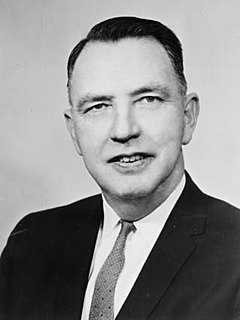
John Brophy "Jack" Renshaw AC was an Australian politician. He was Labor Premier of New South Wales from 30 April 1964 to 13 May 1965. He was the first New South Wales Premier born in the 20th century.

Sir Percy Claude Spender was an Australian politician, diplomat, and judge. He served in the House of Representatives from 1937 to 1951, including as a cabinet minister under Robert Menzies and Arthur Fadden. He was later Ambassador to the United States (1951–1958) and a member of the International Court of Justice (1958–1967), including as president of the court from 1964 to 1967.
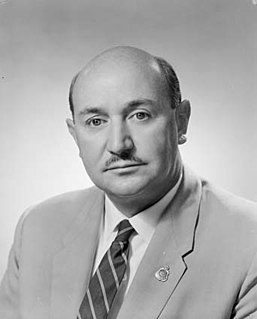
Sir Reginald William Colin Swartz KBE, best known as Reg Swartz, was an Australian Liberal Party politician who was Minister during the governments of Sir Robert Menzies, Harold Holt and John Gorton. In particular, he is best known as the Minister for Civil Aviation between 1966 and 1969.

Hattil Spencer "Harry" Foll was an Australian politician who served as a Senator for Queensland from 1917 to 1947. He took office at the age of 27, and at the time was the youngest person to serve in the Senate. Foll began his career in the Nationalist Party, later joining the United Australia Party (UAP) in 1931 and Liberal Party in 1945. He held ministerial office as Minister for Repatriation (1937–1938), Minister for Health (1938–1939), Minister for the Interior (1939–1941), and Minister for Information (1940–1941). He was a member of the War Cabinet during World War II.

Lieutenant Colonel Sir Michael Frederick Bruxner was an Australian politician and soldier, serving for many years as leader of the Country Party in New South Wales. Born in the north of the state, Bruxner was educated at The Armidale School and started studies at University of Sydney but later dropped out to take up employment as a grazier and station agent in Tenterfield. After serving in the Citizen Military Forces from 1911, Bruxner enlisted into the Australian Light Horse upon the outbreak of the First World War in 1914. Serving with distinction in Gallipoli, Egypt and Palestine, he was promoted to lieutenant colonel and awarded the Distinguished Service Order.

Sir Eric John Harrison, was an Australian politician and diplomat. He was the inaugural deputy leader of the Liberal Party (1945–1956), and a government minister under four prime ministers. He was later High Commissioner to the United Kingdom from 1956 to 1964.
A political family of Australia is a family in which multiple members are involved in Australian politics, particularly electoral politics. Members may be related by blood or marriage; often several generations or multiple siblings may be involved.
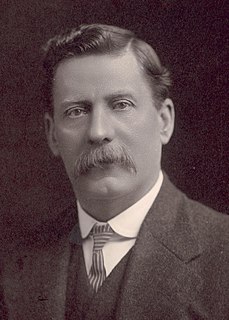
Edward Davis Millen was an Australian journalist and politician who served as the first Minister for Repatriation.
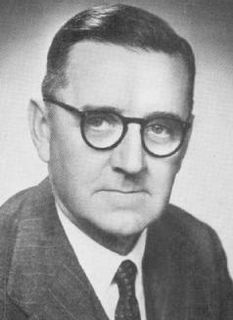
Sir Philip Albert Martin McBride, was an Australian politician. He was a United Australia Party member of the Australian House of Representatives for Grey from 1931 to 1937 and the Australian Senate from 1937 to 1944, and a Liberal Party of Australia member of the House of Representatives for Wakefield from 1946 to 1958. He served as a minister in both of Robert Menzies' governments, as Minister for the Army and Minister for Repatriation (1940), Minister for Supply and Development and Minister for Munitions (1940–1941), Minister for the Interior (1949–1950), and Minister for Defence (1950–1958).

Peter Erne Baume, AC is a retired Australian doctor and politician. He was a Senator for New South Wales from 1974 to 1991, representing the Liberal Party. He served as Minister for Aboriginal Affairs (1980–1982) and Minister for Education (1982–1983) in the Fraser Government.
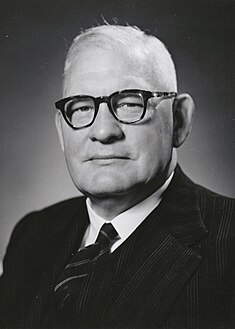
Sir William Henry Spooner, was an Australian politician who served as a Senator for New South Wales from 1950 to 1965, representing the Liberal Party. He was a senior minister in the Menzies Government, serving as Minister for Social Services from 1949 to 1951 and then Minister for National Development from 1951 to 1964. He was Leader of the Government in the Senate from 1958 to 1964.
Douglas Barr Scott was a former Australian National Party politician and briefly government minister.
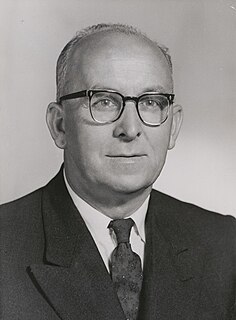
James Patrick Ormonde was a Scottish-born Australian politician. Born in Fife, he migrated to Australia as a child and was educated at Catholic schools in Maitland, New South Wales. He became a journalist first with the Labor Daily and then with the Sydney Morning Herald. In 1958, he was appointed to the Australian Senate as a Labor Senator for New South Wales, filling the casual vacancy resulting from the death of Labor Senator Bill Ashley. He was re-elected in the 1958 election, but the remainder of Ashley's term was filled by Colin McKellar; thus, Ormonde was not a Senator between 22 November 1958 and 1 July 1959. He remained in the Senate until his retirement in 1970; however, he died before his retirement took effect in 1971 and Jim McClelland, who had been elected to replace him, filled the vacancy.
This is a list of members of the Australian Senate from 1968 to 1971. Half of its members were elected at the 5 December 1964 half Senate election and had terms due to finish on 30 June 1971; the other half were elected at 25 November 1967 half Senate election and had terms due to finish on 30 June 1974. The process for filling casual vacancies was complex. While senators were elected for a six-year term, people appointed to a casual vacancy only held office until the earlier of the next election for the House of Representatives or the Senate.
This is a list of members of the Australian Senate from 1956 to 1959. Half of its members were elected at the 9 May 1953 election and had terms starting on 1 July 1953 and finishing on 30 June 1959; the other half were elected at the 10 December 1955 election and had terms starting on 1 July 1956 and finishing on 30 June 1962. The process for filling casual vacancies was complex. While senators were elected for a six-year term, people appointed to a casual vacancy only held office until the earlier of the next election for the House of Representatives or the Senate.
James Lawrence Curran was a NSW politician (Australia) from Gilgandra, NSW. He was a Labor Party member of the New South Wales Legislative Assembly from 1980 to 1981, representing the electorate of Castlereagh.
















